I am creating a very simple file search, where the search database is a text file with one file name per line. The database is built with PHP, and matches are found by grepping the file (also with PHP).
This works great in Linux, but not on Mac when non-ascii characters are used. It looks like names are encoded differently on HFS+ (MacOSX) than on e.g. ext3 (Linux). Here's a test.php:
<?php
$mystring = "abcóüÚdefå";
file_put_contents($mystring, "");
$h = dir('.');
$h->read(); // "."
$h->read(); // ".."
$filename = $h->read();
print "string: $mystring and filename: $filename are ";
if ($mystring == $filename) print "equal\n";
else print "different\n";
When run MacOSX:
$ php test.php
string: abcóüÚdefå and filename: abcóüÚdefå are different
$ php test.php |cat -evt
string: abcóü?M-^Zdefå$ and filename: abco?M-^Au?M-^HU?M-^Adefa?M-^J are different$
When run on Linux (or on a nfs-mounted ext3 filesystem on MacOSX):
$ php test.php
string: abcóüÚdefå and filename: abcóüÚdefå are equal
$ php test.php |cat -evt
string: abcM-CM-3M-CM-<M-CM-^ZdefM-CM-% and filename: abcM-CM-3M-CM-<M-CM-^ZdefM-CM-% are equal$
Is there a way to make this script return "equal" on both platforms?
